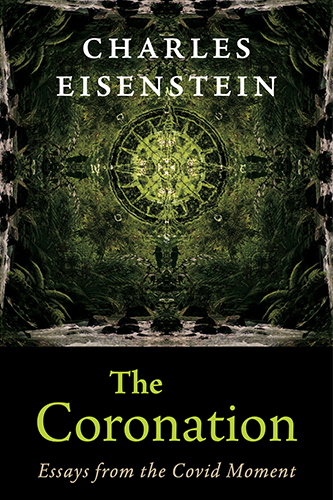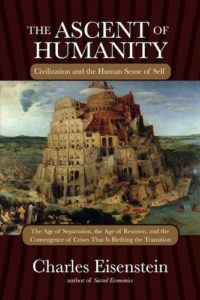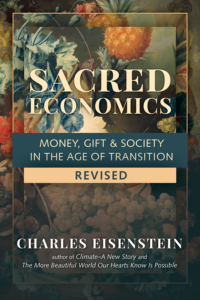The Ascent of Humanity
Chapters
Chapter 4: Money and Property
The Economics of Other
The conversion of life into money means that there is ever more of the latter and less of the former. In our economic calculus, however, this is seen unambiguously as an increase in wealth, which is a quantitative concept denominated by money. Anything without a monetary exchange value is invisible, outside economic logic. These “externalities” are the counterpart of Galileo’s excluded subjective properties (only that which can be measured, denominated, counts). They are also counterpart to the “other” that technology makes of the world. Herein lies the fundamental difference between modern economies and natural ecologies.
In nature there is no waste (except for heat radiated out into space); as Paul Hawken puts it, “Waste is food.” Natural processes are therefore cyclical. What comes from the earth eventually returns to the earth in a form usable to other living beings. There is no linear buildup of waste, no linear drawdown of essential resources. Industry, on the other hand, is linear in that it starts with resources and ends with waste—economically valueless, even biologically hazardous substances that must be disposed of. Since “resources” such as the social, cultural, natural, and spiritual capital described in this chapter begin outside the domain of money, their commoditization and depletion makes us by definition richer, adding to gross domestic product. Meanwhile, because these resources are not endlessly recycled, their depletion accompanies a corresponding growth of material, social, and spiritual waste: slag heaps and slums, toxic waste dumps and toxic bodies, dying lakes and wrecked cultures, degraded ecosystems and broken families.
The linear character of the modern economy is obviously unsustainable, because both resources and the earth’s capacity to absorb waste are finite. The modern economy therefore represents an outright denial of humanity’s participation in nature, and embodies a belief that the laws of nature do not apply to us.
Classical economics denies the finiteness of resources by saying their depletion will cause prices to rise, stimulating innovation in the search for replacements. In other words, when we deplete oil to the point where it costs $500 a barrel, huge incentives will encourage development of alternative energy sources. When we deplete topsoil to the point where soil-grown food becomes prohibitively expensive, we will find other ways to grow or synthesize food. When we destroy the ozone layer, innovation will be brought to bear to invent the Lifeskin® personal security suit and the Ecodome® ecological containment enclosure. The unstated assumption is that our ability to engineer and control the universe is infinite—as the price of a depleted resource rises toward infinity, so does the incentive (and by implication the capacity) to innovate. You should by now recognize the telltale signature of the technological fix, and the Technological Program that carries us farther and farther from nature. It is written into the assumptions of economics. If the oceans are depleted of fish, no matter, we’ll just farm them. If the soil becomes unusable, why, we’ll just make new soil. If the earth becomes uninhabitable, why, we’ll just construct a new earth.
The assurances of classical economics and the ideology of control are beginning to wear a little thin, though, because as described in Chapter One, the world seems to be spinning out of control. Our problems proliferate faster than we can manage them. Life goes on only with increasingly frantic efforts to keep everything together for now, while vast problems are sequestered away for later. We do this collectively, in the form of temporary containment of toxic and radioactive waste (science will surely find a permanent solution before it starts leaking in forty years), as well as individually, when we ignore huge contradictions in life and pave over festering wounds the way chemical companies might pave over buried toxic waste. But as one popular title says, “Feelings buried alive never die.” This is just as true of our collective garbage as it is of our personal garbage.
If the certainty of the Technological Program and the promise of economic logic are misguided, then the depletion of natural capital is simply a drawdown of capital reserves, not the creation of new wealth, and the accumulation of waste is simply a bill to be paid, and not a disposal into a limitless outside. How could we think otherwise? Only if we conceive of ourselves as existing apart from nature, so that there is indeed a place to throw things “out”. How else could we countenance the production of persistent bio-accumulating poisons such as PCB’s, mercury, and dioxin? A culture that knew nature as sacred wouldn’t dare. A culture whose sense of itself included plants, animals, forests, and land wouldn’t dare. That we indeed dare is simply a product of our own self-misconception. Only if we see ourselves as fundamentally separate from nature is it reasonable to think that the poison won’t eventually affect us.
The same logic of externalization applies on the level of the individual or corporation. Profits accrue to those who most successfully externalize their costs. This is Step Two of the eternal formula for business success. Step One was to take something away from people (e.g. social capital) and sell it back again. Step Two is to make someone else pay at least some of the costs, while you get the profits.
Do the printers of unwanted junk mail have to pay the costs of disposing it in landfills? Do the makers or users of pesticides have to pay the costs of cleaning the groundwater they eventually contaminate? Do the makers or users of nitrogen fertilizer have to pay the costs of eutrophication (algae blooms that deoxygenate water and kill the fish)? Would the mounds of plastic junk we buy every Christmas still be so cheap if they incorporated the medical costs of toxic petroleum byproducts? When cancer rates rise 500% near an incinerator, refinery, or paper mill, does the manufacturer pay the medical costs? Paul Hawken writes,
Gasoline is cheap in the United States because its price does not reflect the cost of smog, acid rain, and their subsequent effects on health and the environment. Likewise, American food is the cheapest in the world, but the price does not reflect the fact that we have depleted the soil, reducing average topsoil from a depth of twenty-one to six inches over the past hundred years, contaminated our groundwater (farmers do not drink from wells in Iowa), and poisoned wildlife through the use of pesticides.[36]
In some cases, such as a polluting factory, it is the neighbors who pay the costs. Build the smokestacks higher, and it is fishermen thousands of miles away who pay the costs. But only part of those costs, because acid rain does more than kill lakes; it also contributes to massive tree die-offs decades later. The costs of ecosystem disruption are untraceable to a single source, highly distributed, impossible to predict accurately in advance, and often paid only by future generations.
As long ago as 1920, economist A.C. Pigou realized that for markets to promote the general welfare, producers must pay the full costs of production; means must be found to “internalize” external costs like those listed above. His solution was governmental imposition of “Pigovian” taxes or subsidies to make products reflect their true costs. Forty years later, R.H. Coase demonstrated that such government intervention is unnecessary—if transaction costs are zero (a favorite assumption of economists in their mathematical games) and if property rights are “properly assigned”.[37] Although Coase is often cited to justify a libertarian, non-interventionist policy based on property rights, his work actually implies that this is impractical because of the problem of transaction costs. When costs are highly distributed, untraceable to a single source, and hard to calculate, the transaction costs in allocating them are prohibitive. Even more disturbing is the second condition that property rights be “properly” assigned. Coase’s logic essentially demands that everything become the subject of property and be assigned a monetary value. Or in other words, that everything have a price. Yet when residents of the Rocky Mountains were polled on how much money it would take for them to accept air pollution in their area, they said that no amount of money would be adequate compensation for their loss of fresh air and clear views.[38] No amount of money. According to economics, this is a profoundly irrational response. But I bet that you’d answer the same if asked how much money you’d take in exchange for your vision, your right leg, or your child. Indeed, when such things are assigned a monetary value the consequences tend to be monstrous (as in the “kidney industry”). What else could we expect when the infinitely precious is reduced to a finite sum? A fundamental assumption of economics is thus shown to be nonsense, and worse, anti-life. So come on, how much do you want for your health? For your friendships? For your self-respect? For your hours? For your life?
“Every man has his price.” Is that saying really true? Or is it just a symptom of how broken we are to the enslavement of money?
The business model of profiting at the expense of others fits in quite well with traditional biology, in which organisms compete for resources and excrete “wastes” into the “environment”. Money economics similarly views human beings as separate subjects competing for resources, seeking to maximize self-interest—an exact parallel to the Darwinian view of biology. “Human beings are basically selfish”—does that seem like a truism to you? Actually, such behavior is built in to the structure of money. Consequently, the more that money transactions replace human relationships, the more life becomes a struggle among competing “others”. Thomas Carlyle describes the inevitable result in Gospel of Mammonism, “We call it a Society and go about professing openly the totalest separation, isolation. Our life is not a mutual helpfulness; but rather, cloaked under due laws-of-war, named “fair competition” and so forth, it is a mutual hostility.”[39]
Economics is just another facet of the dualism of self and other, a distorting lens that warps our entire understanding of the universe. But now we are beginning to understand that nature is not like that, and that we are not separate from nature. Traditionally, we have seen organisms as using resources and excreting waste into the environment, which by some lucky chance has other organisms that have evolved to recycle the waste through the system. What does the individual rock-weathering bacterium care that its wastes eventually provide calcium carbonate for some sea creature? No positive reinforcement reaches it quickly enough to affect natural selection. Is it by some lucky chance that so far no organism except for man has created waste that is unusable and deadly to the rest of life?
The totalizing trend of money and its conceptual equivalence to utility or goodness is responsible for the lunacy of current economic accounting, in which phenomena like cancer, toxic waste leaks, divorce, imprisonment, and so forth contribute to GDP—the total value of all “goods” and “services”. As long as the damage caused to people, cultures, and ecosystems is not denominated in money, it is in the realm of other, off the balance sheet. The same goes for business accounting, in which costs can only be externalized when the payer is, again, off the balance sheet—an other. To the extent that we identify with our communities, we cannot export costs to them. Both social pressures and our own conscience will stop us. To the extent that we identify with nature, neither can we see as profit anything that diminishes the overall wholeness and beauty of the earth.
Yet as anyone who has ever tried to do business with a conscience knows, powerful forces seem to conspire to enforce a ruthless approach to business. Do-gooders get forced out of business by those who more efficiently externalize their costs. Everyday experience confirms competition as a fact of life. Why? Because, due to the monetization of all the forms of capital that allowed us to survive without it, money has become essential to life. And money, in turn, has built-in characteristics which reinforce all the processes of separation, alienation, competition, and ongoing conversion of life into money.
[36] Paul Hawken, The Ecology of Commerce, p. 76
[37] Coase, Ronald H. The Problem of Social Cost. J. Law & Econ. 3, p. 1 (1960)
[38] How much money would you accept in exchange for living in an ugly world?
[39] Thomas Carlyle, “Gospel of Mammonism”, Past and Present, Book 3, Chapter 2, quoted by Kirkpatrick Sale in Rebels Against the Future.






